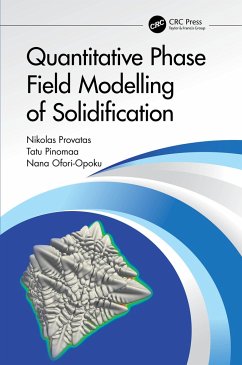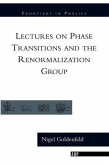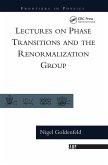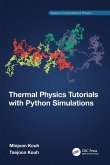Nikolas Provatas, Tatu Pinomaa, Nana Ofori-Opoku
Quantitative Phase Field Modelling of Solidification
Nikolas Provatas, Tatu Pinomaa, Nana Ofori-Opoku
Quantitative Phase Field Modelling of Solidification
- Gebundenes Buch
- Merkliste
- Auf die Merkliste
- Bewerten Bewerten
- Teilen
- Produkt teilen
- Produkterinnerung
- Produkterinnerung
This book presents a study of phase field modelling of solidification in metal alloy systems. It is divided in two main themes.
Andere Kunden interessierten sich auch für
![Quantitative Phase Field Modelling of Solidification Quantitative Phase Field Modelling of Solidification]() Nikolas ProvatasQuantitative Phase Field Modelling of Solidification66,99 €
Nikolas ProvatasQuantitative Phase Field Modelling of Solidification66,99 €![Phase Transformations in Metals and Alloys Phase Transformations in Metals and Alloys]() David A. Porter (Finland University of Oulu)Phase Transformations in Metals and Alloys80,99 €
David A. Porter (Finland University of Oulu)Phase Transformations in Metals and Alloys80,99 €![Lectures On Phase Transitions And The Renormalization Group Lectures On Phase Transitions And The Renormalization Group]() Nigel GoldenfeldLectures On Phase Transitions And The Renormalization Group80,99 €
Nigel GoldenfeldLectures On Phase Transitions And The Renormalization Group80,99 €![Lectures On Phase Transitions And The Renormalization Group Lectures On Phase Transitions And The Renormalization Group]() Nigel GoldenfeldLectures On Phase Transitions And The Renormalization Group152,99 €
Nigel GoldenfeldLectures On Phase Transitions And The Renormalization Group152,99 €![No-Frills Physics No-Frills Physics]() Matthew D. McCluskey (Washington State University, Pullman, USA)No-Frills Physics51,99 €
Matthew D. McCluskey (Washington State University, Pullman, USA)No-Frills Physics51,99 €![Thermal Physics Tutorials with Python Simulations Thermal Physics Tutorials with Python Simulations]() Minjoon KouhThermal Physics Tutorials with Python Simulations66,99 €
Minjoon KouhThermal Physics Tutorials with Python Simulations66,99 €![No-Frills Physics No-Frills Physics]() Matthew D. McCluskey (Washington State University, Pullman, USA)No-Frills Physics111,99 €
Matthew D. McCluskey (Washington State University, Pullman, USA)No-Frills Physics111,99 €-
-
-
This book presents a study of phase field modelling of solidification in metal alloy systems. It is divided in two main themes.
Produktdetails
- Produktdetails
- Verlag: Taylor & Francis Ltd
- Seitenzahl: 174
- Erscheinungstermin: 13. Oktober 2021
- Englisch
- Abmessung: 234mm x 156mm x 13mm
- Gewicht: 430g
- ISBN-13: 9780367768577
- ISBN-10: 0367768577
- Artikelnr.: 62220236
- Herstellerkennzeichnung
- Libri GmbH
- Europaallee 1
- 36244 Bad Hersfeld
- gpsr@libri.de
- Verlag: Taylor & Francis Ltd
- Seitenzahl: 174
- Erscheinungstermin: 13. Oktober 2021
- Englisch
- Abmessung: 234mm x 156mm x 13mm
- Gewicht: 430g
- ISBN-13: 9780367768577
- ISBN-10: 0367768577
- Artikelnr.: 62220236
- Herstellerkennzeichnung
- Libri GmbH
- Europaallee 1
- 36244 Bad Hersfeld
- gpsr@libri.de
Nikolas Provatas is a professor of physics at McGill University and holds a Canada Research Chair (Tier 1) in Computational Materials Science. He is also the Scientific Director of the McGill High Performance Computing Centre. From 2001-2012, he was a professor of Materials Science and Engineering at McMaster University. His research uses high-performance computing, dynamic adaptive mesh refinement techniques, condensed matter physics and experimentation to understand the fundamental origins of nano-microstructure pattern formation in non-equilibrium phase transformations, and the role of microstructure in materials processes. He has made numerous scientific contributions to the understanding of length scale selection in dendritic solidification and meta-stable phase formation in solid-state transformations in metal alloys. Nana Ofori-Opoku is a Research Scientist at Canadian Nuclear Laboratories Ltd. He received his doctorate in materials science from McMaster University, where he explored computational models for microstructure evolution in materials. He did his postdoctoral work at McGill University, followed by a NIST-CHiMaD fellowship at Northwestern University and the National Institute of Standards and Technology. His research continues to develop theoretical and computational tools to study microstructure evolution in nuclear materials and the dynamics of phase transformations. Tatu Pinomaa is a Senior Scientist at VTT Technical Research Centre of Finland Ltd. He received his doctor of science (tech) degree from Aalto University (Finland), where he developed phase field modeling techniques to investigate rapid solidification microstructures in metal additive manufacturing conditions. In his current research, he combines various computational approaches to predict the formation, evolution, and micromechanical response of metallic microstructures for industrial applications.
1. A Brief History of Phase Field Modelling. 2. Overview of the Book. 3.
Recap of Grand Potential Thermodynamics. 4. Grand Potential Phase Field
Functional. 5. Phase Field Dynamics. 6. Re-Casting the Phase Field
Equations for Quantitative Simulations. 7. Equilibrium Properties of Grand
Potential Funcional. 8. Thermal Fluctuations in the Phase Field Equations.
9. Special Cases of the Grand Potential Phase Field Model. 10. Application:
Phase Field Modelling of Ternary Alloys. 11. Interpreting Asymptotic
Analyses of Phase Field Models. 12. The Regime of Rapid Solidification. 13.
Modelling Continuous Growth Kinetics in the Diffuse Interface Limit of the
Grand Potential Phase Field Equations. 14. Applications: Phase Field
Simulations of Rapid Solidificaation of a Binary Alloy
Recap of Grand Potential Thermodynamics. 4. Grand Potential Phase Field
Functional. 5. Phase Field Dynamics. 6. Re-Casting the Phase Field
Equations for Quantitative Simulations. 7. Equilibrium Properties of Grand
Potential Funcional. 8. Thermal Fluctuations in the Phase Field Equations.
9. Special Cases of the Grand Potential Phase Field Model. 10. Application:
Phase Field Modelling of Ternary Alloys. 11. Interpreting Asymptotic
Analyses of Phase Field Models. 12. The Regime of Rapid Solidification. 13.
Modelling Continuous Growth Kinetics in the Diffuse Interface Limit of the
Grand Potential Phase Field Equations. 14. Applications: Phase Field
Simulations of Rapid Solidificaation of a Binary Alloy
1. A Brief History of Phase Field Modelling. 2. Overview of the Book. 3.
Recap of Grand Potential Thermodynamics. 4. Grand Potential Phase Field
Functional. 5. Phase Field Dynamics. 6. Re-Casting the Phase Field
Equations for Quantitative Simulations. 7. Equilibrium Properties of Grand
Potential Funcional. 8. Thermal Fluctuations in the Phase Field Equations.
9. Special Cases of the Grand Potential Phase Field Model. 10. Application:
Phase Field Modelling of Ternary Alloys. 11. Interpreting Asymptotic
Analyses of Phase Field Models. 12. The Regime of Rapid Solidification. 13.
Modelling Continuous Growth Kinetics in the Diffuse Interface Limit of the
Grand Potential Phase Field Equations. 14. Applications: Phase Field
Simulations of Rapid Solidificaation of a Binary Alloy
Recap of Grand Potential Thermodynamics. 4. Grand Potential Phase Field
Functional. 5. Phase Field Dynamics. 6. Re-Casting the Phase Field
Equations for Quantitative Simulations. 7. Equilibrium Properties of Grand
Potential Funcional. 8. Thermal Fluctuations in the Phase Field Equations.
9. Special Cases of the Grand Potential Phase Field Model. 10. Application:
Phase Field Modelling of Ternary Alloys. 11. Interpreting Asymptotic
Analyses of Phase Field Models. 12. The Regime of Rapid Solidification. 13.
Modelling Continuous Growth Kinetics in the Diffuse Interface Limit of the
Grand Potential Phase Field Equations. 14. Applications: Phase Field
Simulations of Rapid Solidificaation of a Binary Alloy








